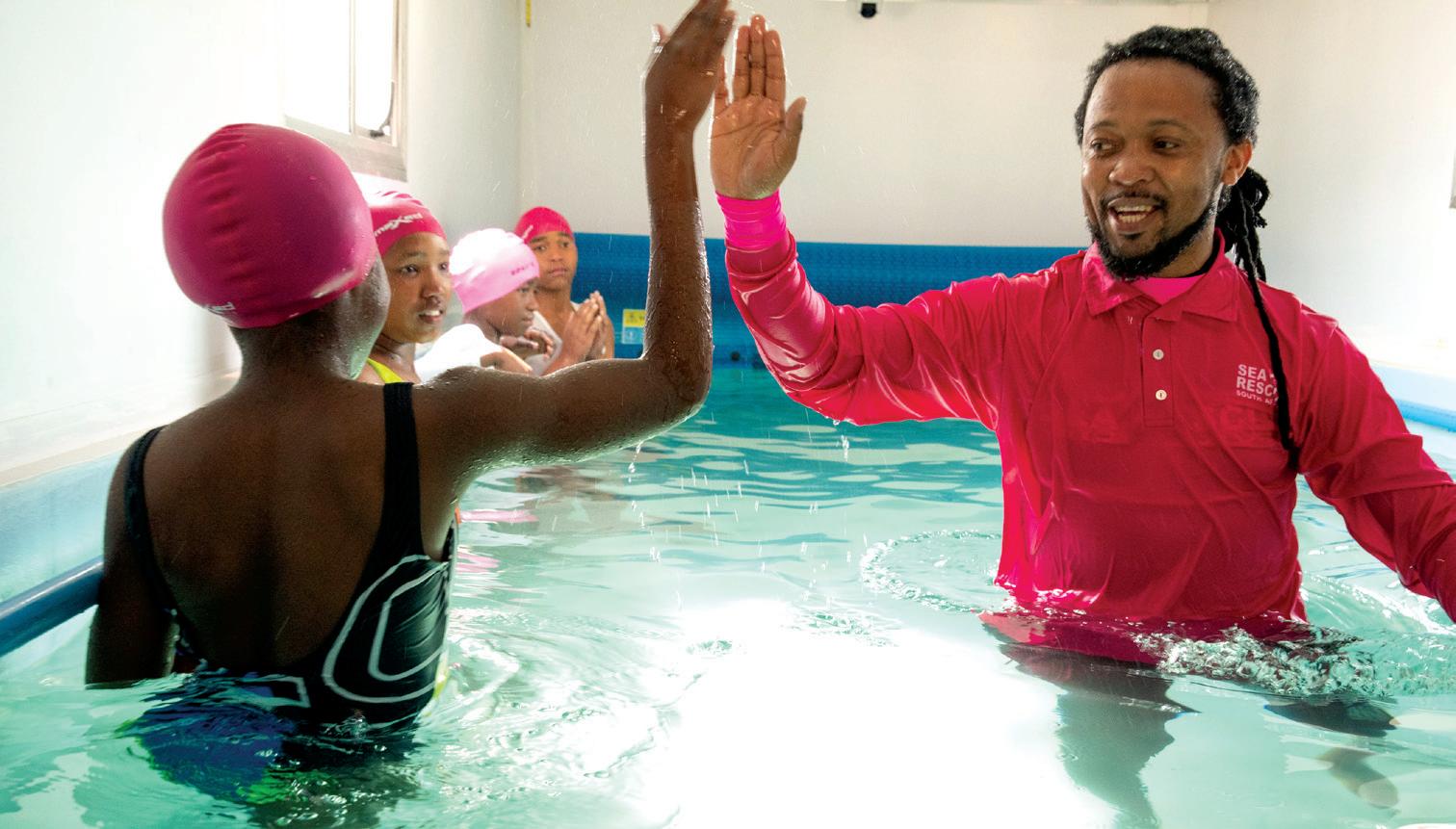
4 minute read
SAVING LIVES, ONE CHILD AT A TIME
Mlungisi Ndamase is one of two survival swimming instructors stationed at SSC2 at Noah-Christian Academy in Tombo, Port St Johns. We chatted to him about his life-saving work with the NSRI. By Wendy Maritz
MLUNGISI NDAMASE FEELS privileged to be part of the team teaching survival swimming skills at Noah-Christian Academy. It’s a perfect fit, as Mlungisi grew up in Mthumbane township nearby, has a background as a lifeguard and is also an NSRI water-safety instructor in the area. He and Abongile Ngxola spend their days educating not only the children but also teachers and other adults about the basic skills needed to feel comfortable enough in water to get yourself to safety. ‘I decided to become a survival swimming instructor because I felt that
I could do more in terms of helping the children and community at large. I work as a water-safety educator and lifeguard and know that training people how to survive when facing difficulty in water is a great life skill that can never be taken away from them. And it’s something they can pass on to their families. This will in turn lead to less drownings,’ Mlungisi shares.
So far, Mlungisi has loved teaching the children. ‘The effort they put in is awesome,’ he smiles. He acknowledges that the kids arrive excited but are sometimes also scared before their first lesson. ‘I can see it in their faces,’ he says. ‘But then it’s amazing to see them relax and loosen up by the end of the session. They’re slowly learning that they will be able to help themselves should they ever have a bad encounter in the water.’
Mlungisi has been encouraged to see how many adults have wanted to learn survival swimming skills as well. ‘The principal, administration staff, teachers and the female caretaker too… Over 90% of the staff are doing the lessons with us,’ he continues. ‘We held a holiday programme and the spouses of the teachers and members of the community also joined, while others came to observe and make enquiries about when the next ‘intake’ would be. Principals of other schools, community stakeholders in the form of members of the Department of Health, a local youth development organisation and a local school for the disabled were among them.’
While the interest in and the need for learning survival swimming are clear, it’s the one-on-one time with the children Mlungisi enjoys the most. ‘Everyone wants a turn. We haven’t got to the lower grades yet. The children can’t stop saying “thank you”,’ he says. ‘They are so enthusiastic and they want to learn more, and ask important questions about getting out of trouble in real-life situations.’
The groups of learners make progress at their own pace; some will need more time in the pool than others, but on average it takes about a month (of three lessons a week) for the learners to feel confident with all four skills involved in survival swimming (orientation, breathing, floating and moving to safety). But with some children this may take longer.
Mlungisi notes that part of the programme includes assessments of the learners’ skills development. For instance, during a holiday programme lasting two weeks, learners may learn to master two of the four skills necessary. So feedback and continued assessments are necessary to equip each learner fully, whether they’re a child or an adult, to feel comfortable enough to implement what they have learnt. It’s an honour for Mlungisi to be a part of the team. ‘The NSRI is playing a huge role in saving lives and thereby providing futures, because each person whose life is saved will be able to reach their goals and dreams.’ Coming from a lifeguarding background, being a water safety instructor and, now, getting involved with survival swimming have given Mlungisi the platforms to use his skills for a cause close to his heart – helping to save lives. ‘I can say boldly that I am doing what I love and will forever be grateful to the NSRI for giving me these skills. I am also learning something new every day.’ Mlungisi pauses, smiles and adds, ‘That includes learning pool maintenance!’

The adults are enjoying the lessons as much as the children.








